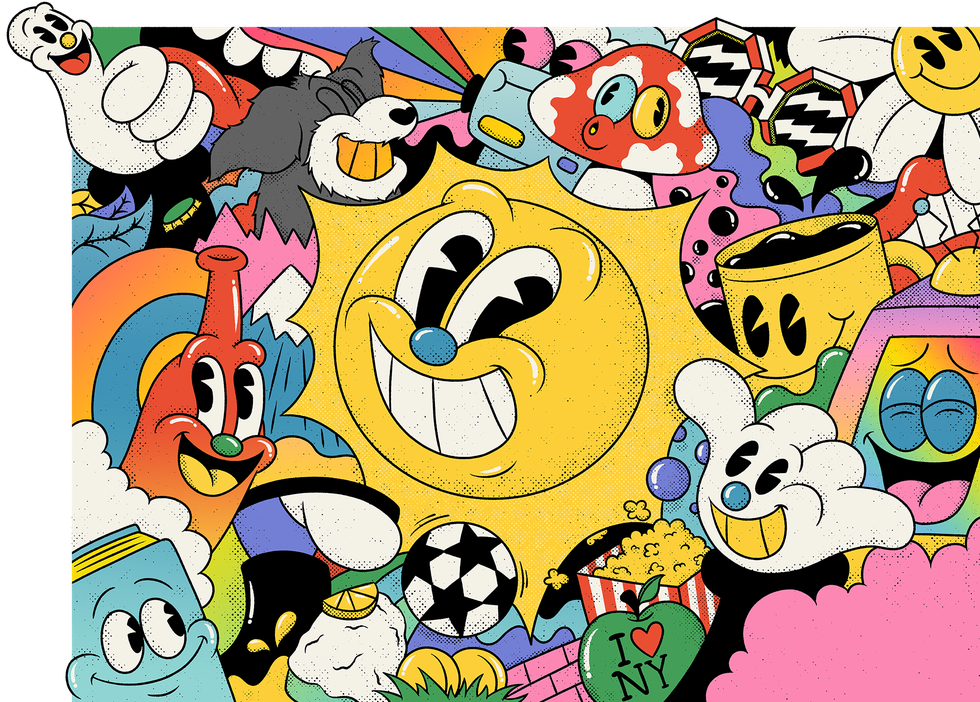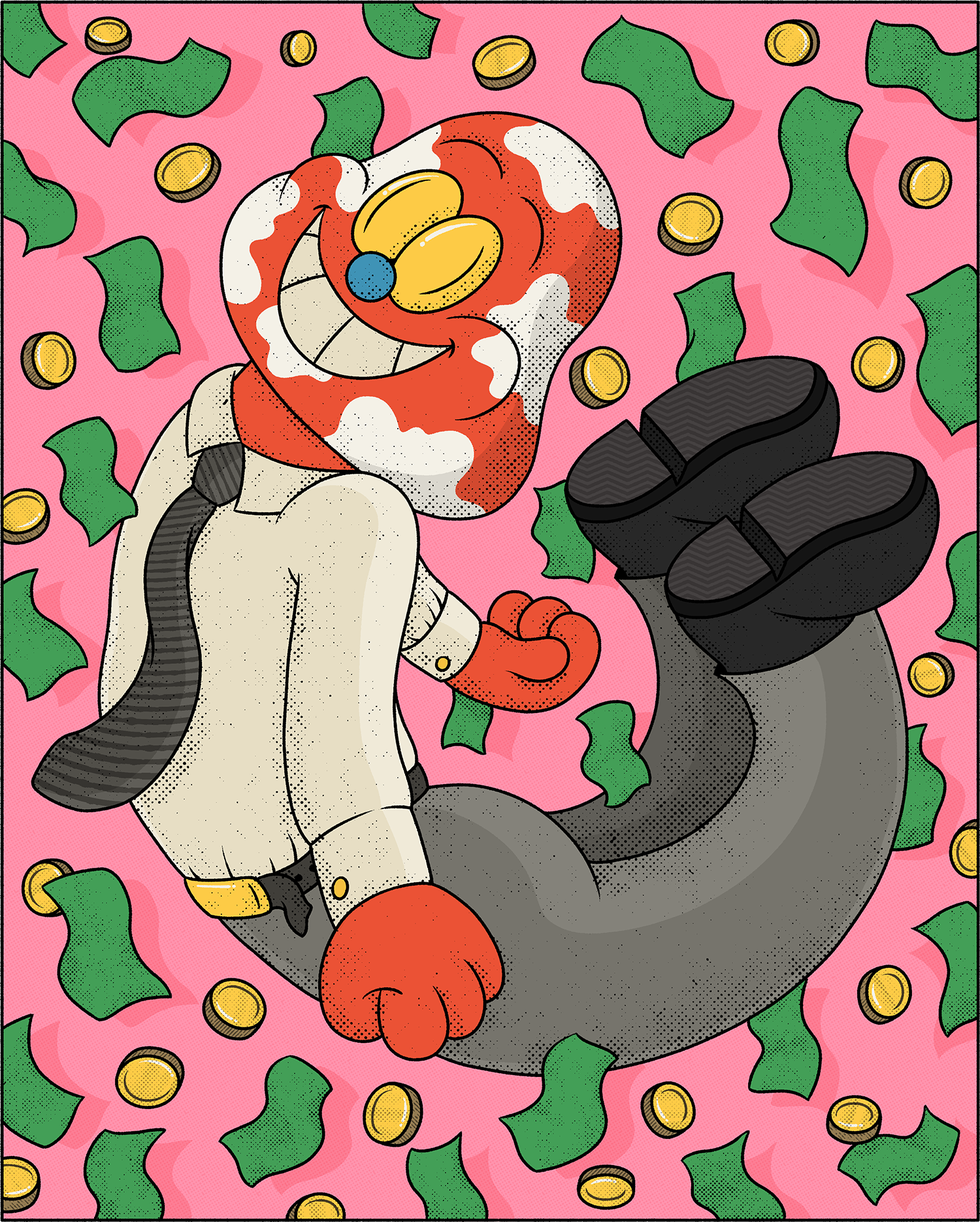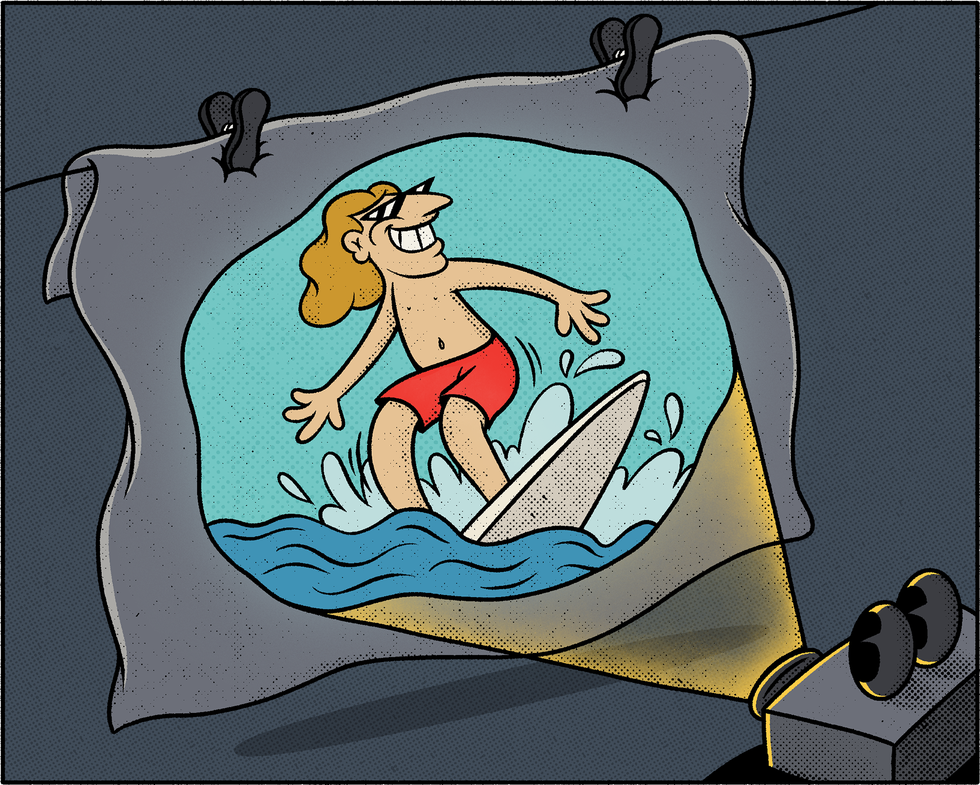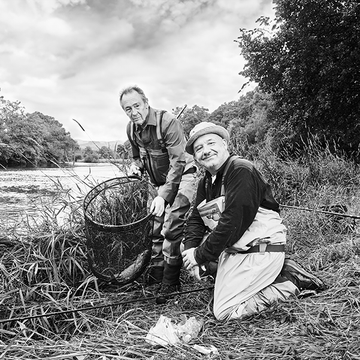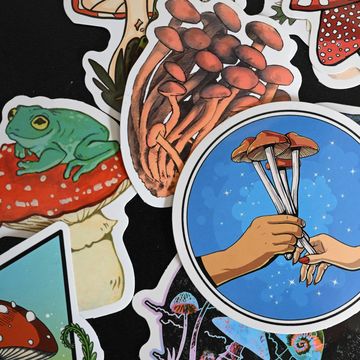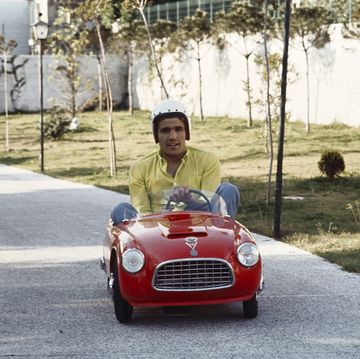I suspect that you, like me, have found moments in the last three years… challenging. We have lived, and continue to live, through a period that future historians will sagely refer to as The Shitshow.
Not to brag, but I’ve coped with it exceptionally badly. I slipped into an extended period of feeling bleak, blue, and powerless during the pandemic. Not some mysterious depression, but the same sort of malaise that almost certainly imposed itself on every one of us in some way or other, as the world fell apart. The trouble was, unlike most other people, as far as I can tell, I just didn’t realise it.
Partly, this can be attributed to the high-wire, peripatetic nature of my ‘career’ – the equal-parts exhilarating and incomprehensible life of the freelance writer/actor/comedian-in-a-double-act/voiceover-artist (“New Ariel All-in-1 Pods, it’s a deep hygienic clean”? That was me, you’re welcome). As a result, the terrifying uncertainty, initially, that we all felt… well, it just didn’t feel worlds apart from the general uncertainty I’ve become accustomed to living with on a daily basis. But, as the world disintegrated, so too did the precarious tightropes that were my professional lifelines. As well as absolute financial disaster [1], every other positive I gleaned from my working life – spontaneity, creativity, constantly mixing and interacting with creative and inspiring friends, even the joy and promise of living in a city, everything was suddenly in abeyance. Do you know what you think about as you go to sleep? I didn’t, until the world shut down, and then I realised; I chip away at the as-yet unsolved creative problems in the various projects I may be working on – the structure of an article, the punchline to a routine, the shape of the next big show – until I slumber. Suddenly, with nothing ahead of me, that was all replaced with white noise.
The other thing that seemed to be my Achilles’ heel, psychologically, was my hitherto invulnerable sense of optimism. And, as the times became ever more unprecedented, my coping mechanism became ever more useless. My youngest brother, whose natural setting is a sort of relaxed, stoic pessimism, took the end of the world as we’d known it in his stride. Things got worse, and slightly better, and then worse again, and he reacted with little more than a sage nod, as though he’d almost been expecting it. “Bad stuff happens,” he’d shrug wryly over Zoom. I, though, whose natural frequency is one of buzzing, foolhardy positivity, found myself emotionally caught short. I was the proverbial frog, imperceptibly boiling in a gelatinous stew of my own thick-headed positivity. And then, far too late, I noticed that I was miserable, and I had no idea what to do about it.
Humans have hunted for enlightenment since long before the Enlightenment. The ancient Egyptians followed a concept of ma'at (harmony and balance), and sought to lead a life so enjoyable that an afterlife which consisted of more of the same would be considered ideal. The Greeks, whilst having no exact word for happiness, pursued a state of eudaimonia – ‘good spirit’ – the definition of which was disputed by the great philosophers, but variously included piety, courage, self-control, and wisdom (and, in some cases, enthusiastic pederasty).
There’s a plausible argument that the self-help industry began with the autobiography of US Founding Father Benjamin Franklin, in which he details the “13 virtues” that assisted his life lived in search of “moral perfection” (they include Temperance, Silence, and Frugality – characteristics Franklin presumably honed at the many parties he wasn’t invited to).
Since then, Dale Carnegie’s 1936 bestseller How to Win Friends and Influence People had a seismic influence on 20th century self-development culture, with followers including Warren Buffett, Steve Forbes, Chuck Norris, and Charles Manson. In the always-on 21stcentury, The Four-Hour Workweek (2007) by Tim Ferris teaches us to hack our way to freedom, whilst former Google executive Mo Gawdat seeks happiness via the techniques of a software engineer in Solve For Happy (2016). ‘Mindfulness’ has now fully infiltrated corporate culture; in 2021, Amazon announced it would be introducing ‘AmaZen stations’ – small, windowless booths (described by Motherboard as “coffin-sized”) containing a computer, via which stressed-out warehouse employees can access “mental health and mindful practices to recharge the internal battery”.
And today? TikTok – which, though I have only my own anecdotal evidence to show for it, is surely healthy as pouring battery acid directly onto one’s own brain – is awash with tips for finding happiness, meaning, and one’s place in the universe. There’s #journaling (a trend with 4.5 billion views, at time of writing), #manifesting (27.5 billion views), and its newest offshoot ‘lucky girl syndrome’ (not something I’ve ever personally felt afflicted with). Tarot reading is huge (44.8 billion views). Astrology (51.1 billion views) is bigger than ever. All of which makes it all a little tricky to know where to begin. As I found out.
What began as a simple Google search – ‘How can I be happier?’ – led to a bewildering array of options, and guides as I found myself diving – nay, falling – headfirst into the happiness industrial complex. Did I want to access peak performance, and exist in a constant flow-state? For that there’s Steve Kotler, CEO-whisperer, “peak-performance expert” and perennial tech-conglomerate keynote speaker. Was I just seeking a sense of inarguably-positive-but-impractically-vague “wellness”? Why not turn to Anya Perry, a “multilingual serial entrepreneur, wellness coach, and your biggest cheerleader”.
Did I want a ‘healer’, helping me find happiness via tapping techniques? There’s the confusingly similarly-named Annie Penny. Or did I want no-nonsense advice from someone who ‘coaches the elite’? I discovered a gentleman based in central London who boasted of incredible success with high net-worth clients, who I eventually didn’t message because I sensed the whiff of the pick-up-artist about him, and for which reason shall remain nameless. Then again, perhaps I wanted apps? There’s Happify (“positive psychology and CBT”), Calm (“Meditation and Sleep”), Headspace (“Meditation and Sleep made Simple”), and SuperBetter – which encourages you to “Live Gamefully”, and gives you points for doing simple tasks like going for a walk or drinking some water.
The upshot – I found myself with even less of a notion of what I wanted, and even more bewildered about how to seek it. It felt like I’d fallen into a bottomless pit of coaches, and coaches who coach coaches, and apps that replace the coaches coached by coaches. I found it rather wearying. In the end, I decided to spread my interests – to speak to a number of people, who took different approaches. And so let us begin.
1. THE HYPNOTIST
“Just go deeper, and deeper and deeper, into an absolutely relaxed state…” My head lolled forwards as Marisa Peer hypnotised me.
Although I hadn’t anticipated this at the start of our Zoom interview, this was naivety on my part (Peer’s Twitter bio begins “Celebrity Hypnotherapist”). Peer is blond, poised and twinkly-eyed, with a soothing RP voice and an enormous YouTube presence (at time of writing, her channel has 31,439,795 views). She describes her work as Rapid Transformational Therapy, or RTT, a form of regression therapy which she claims can solve clients’ problems in just a few sessions.
I explained my myriad interlinked stresses, which she boiled down to a specific – worries about financial stability (fair) – at which point Peer announced my impending hypnosis. “You’ll be great at this,” said Marisa. “You’re creative, so you’re very suggestible” (I’d suggest she’s right). My eyes closed, she began to place me into a state of relaxation – “You are going to go right back, way back, to a scene from your childhood…” It was an odd, vibrant hour spent ricocheting around my own memories. As per Peer’s encouragement, I dredged up long-forgotten “scenes” from my past, including early parental conversations, pocket money disputes, and library fines. I recited them back to Peer (and when I got stuck, she lured the memories out of me with shameless flattery “Your brilliant mind, your creative mind…”), and then she found a common thread linking them all – in my case, a pervasive sense of money and finances being unknowable, scary, impossible to deal with. Having identified this, she led me through a set of affirmations – purging, almost, the negative connotations she’s ascribed to each “scene”. By the end, I felt as though my memories had received a deep tissue massage.
I came away from our session with the conclusion Peer is very good at what she does; the elegant logic with which she binds your memories prompts positive connections to form, which linger.
But I also had reservations about her methods; about the potential for people with vulnerabilities far more sensitive than mine – unresolved traumas, or deep-seated mental health conditions – to attempt to use her regression techniques to swiftly tie up their issues in a bow, and walk away from them. A highly critical piece in The Times in May 2021 cites what it sees as predatory sales techniques used on aspiring coaches, and unfounded claims of RTT’s efficacy (by contrast, Peer’s website claims RTT is “becoming more recognized and validated regularly”, and is endorsed by the Australian Society of Clinical Hypnotherapists, the International Institute of Complementary Therapies, and the International Association of Complementary Therapists – though the latter seems to be joinable via an online form, and costs $128 USD whether you’re a professional or “anyone with an interest in complementary healthcare”).
I sought out an experience from the other end of the spectrum – a practice that was active, rather than therapeutic. An approach as unvarnished and brash as Peer’s was smooth and polished. Someone to cut through the fug. Which is when Paul Mort swaggered into my life.
2. THE GEEZER
“This is about high-impact – or what I call violent – accountability.”
Paul Mort, a loud, tough-talking Geordie wearing a t-shirt with the slogan “Unstoppable Bastards” and a logo of a raised middle finger, is filling my laptop screen, telling me how to be happier. Energised and animated, though not aggressive, he jabs his finger at the camera.
“Action is the only answer. You cannot study your way better – you cannot think your way better. Action is the only answer.”
I scribble notes down on my Unstoppable Mindset worksheet, as the video plays on.
“Transformation,” says Paul Mort, “is not a spectator sport.”
Mort has made his name, and his fortune, coaching men – often, he explains, working-class blokes – who have found themselves hitting rock bottom, a situation Mort has been in himself. His life coach origin story begins with Mort feeling suicidal, on the verge of jumping off a cliff, before being confronted by his wife, who exhorted him to turn things around for the sake of his children. The video which launched his career, in which he recounts this tale, talking straight to camera against a backdrop of those windy cliffs, now has over 6 million views. It’s representative of his whole style – gnarly, slightly low-tech, warts and all, but with a compellingly-delivered message. “A life coach telling me to think positively, build a vision board, manifest shit? It’s almost laughable for a man like me,” snarls Mort. “What I needed was a slap round the face.” Mort’s modus operandi is obsessively focussed on accountability – “Someone to call me out on my bullshit” – and taking action: “If I can unconsciously build this shit – this pit, that I hate – what could I achieve consciously?”
“I've had lots of therapy in the past, and I don't want to tar it all with the same brush,” says Mort when we speak on the phone, “But you tend to just repeat the same thing over and over again. I can always tell when someone's had a lot of counselling or therapy, because they’re very good at telling me their story. Does that make sense?” Mort’s not one for lengthy conversations – when we speak, I mentally prepare myself to bare my soul… and then 10 minutes later, breezily, he’s gone. Instead, emails ping in for his “Unstoppable Mindset” course. It’s more-or-less automated, and consists of four “Missions”: a series of videos accompanied by a number of worksheets, which Mort freely admits he doesn’t read; he simply knows if you don’t fill them in.
In a curious way, I found myself slightly drawn to Mort’s indifference to my specific plight – or lack of plight, or general, fuzzy, confused state of imperfect human existence. Used to addressing large rooms, or Zoom calls full of acolytes, Mort speaks in broad terms about the actions needed to pursue happiness, peppering his sentences with interrogative questions that require actionable answers (“What needs to change to make you happier?”) and accompanied by hastily scrawled handwritten notes on an iPad, which give his edicts a sense of urgency. He generally eschews one-on-one sessions, instead focusing on scalable “trainings”, that take place with the help of a team, with Mort as the charismatic figurehead. As Mort puts it when we speak, “This way, I can help more people,” which is true. It’s also a good business model.
As for the “Unstoppable Mindset” course? Well, I… liked it. It breaks down into extremely simple tasks, which one completes daily – identifying emotional aims, identifying ways of achieving them, and highlighting successes of the previous day, with each Mission adding one more simple task to the daily itinerary. And, on the final stage of the course, Mort touched directly on the sensation that led me to him in the first place: “People don’t know how to deal with failure, stress, their expectations not being met, their income not meeting their expectations – they have no idea how to deal with it.”
I log my achievements. I express gratitude and thanks to the important people in my life. I drink enough water. I exercise. None of these things is mysterious or new – but the conscious balance of them all, in pursuit of a harmonious whole, feels like something I’ve never, up until this point in my life, actively attempted to cultivate. And if I ever need further motivation, there’s Mort on Instagram, barking to his followers and spurring them on - to #getyourshittogether, to #dowhatyousaidyouwould, and to achieve #Success.
3. THE DOCTOR
“We have this really charming and totally untrue illusion in society that happiness comes from success,” says Dr Michael Plant. I was seeking an academic counterpoint to the less regulated world of coaches I’d been enmeshed in, and Dr Plant is a post-doctoral Research Fellow and the Wellbeing Research Centre at the University of Oxford.
“The issue is people focus too much on the story of their life, eg. their status, and not enough on improving the content of their thoughts, or the quality of how they spend their time.”
Dr Plant’s aim is to maximise world happiness, “happiness” being a term he defines thusly: “Experiencing pleasurable conscious states – in other words, feeling good. Psychologists often use the word ‘valence’ to refer to how overall good or bad an experience feels, which is contrasted with 'arousal', how excited you are. So happiness is anything with positive valence. But then joy and elation might be high valence, high arousal, and distinct from contentment, which is high value, low arousal.”
Plant’s explanation immediately helped me better define – and thus understand – my own emotional state. My valence was negative, and my arousal was often high (nowhere near as fun as it sounds). Sad? Sure. Distressed? Absolutely! Tense? Perpetually! I found Plant’s dispassionate chart of emotions strangely calming – a reminder of the ways we all predictably react, give or take, when subjected to life’s pressures.
Plant also prays caution against the “rise ‘n’ grind, always-be-hustling” mentality that creeps, inexorably, across social media feeds – often in those inane infographics that advise you to read six self-help books a week, work four jobs and a “side hustle”, and wake up an hour before you go to bed. He disagrees with “the basic idea that you need to get your head down, work hard and make yourself unhappy now so you can be successful later. If you give up happiness now in the hope of getting it later, and you don’t get it later, then you’ve lost out twice, which seems like a pity. You might accumulate money, but you’re spending your time, which is the ultimate resource.”
4. THE CELEBRITIES
When I wrote to a series of celebrities and public figures asking “What’s the single most important piece of advice you could give, right now, to someone who wants to be happy?” the first responses I received were from Oprah, His Holiness the Dalai Lama, and Joe Lycett. It was a silky smooth “no” from Team Oprah (“Thank you for reaching out about this special piece. Unfortunately, Ms Winfrey is taking a bit of personal time …”), but to my delight, Messrs Lama and Lycett both responded with advice that was wise and witty. I felt I might be onto something.
“If you want others to be happy, practice compassion. If you want to be happy, practice compassion.” - The Dalai Lama
“Make something. It doesn’t have to be big or impressive or even good. It could be a cup of tea or a 10 ft tapestry. A lasagna or a three act play. Being creative is a super power that we all have.” - Joe Lycett
This branch of what might charitably be called “my research” was actually my inspiration for writing this piece in the first place. From the murky depths of eternal-lockdown, I envisaged an article in which the world’s great and the good – from The Rock to David Attenborough – would come together and, pooling their superheroic charisma and ancient wisdom, shine a beacon of positivity that would offer hope and solace in a time of darkness. As it happens, it was a swift “no” from both those particular men, albeit in exactly the manner you’d hope for (Sir David via a brusque message from his lawyer that felt like being rebuked by a stern but twinkly-eyed headteacher brushing off an invite to the pub by an audacious sixth-former on the last day of school [2] and The Rock via a rejection from his reps that was somehow exhilaratingly uplifting [3]). But I wrote to other people, and, to my delight, they started to write back.
Nonagenarian style icon Iris Apfel pithily advised me to lower my expectations [4]. Real-life Beatle Ringo Starr responded with exactly the message you’d expect [5]. Both Hollywood legend Betty White [6] (now sadly departed) and motivational speaker-slash-former champion wrestler Diamond Dallas Page [7] exhorted me focus on the positive (though only DDP’s response used the phrase ‘Negative Nellies’). So too did tech giant Sheryl Sandberg, in a response I found unexpectedly moving [8]. Nation’s sweetheart Joe Wicks recommended I ingest ayahuasca [9]. I was honoured to receive responses from religious leaders [9], from society interior designers [10], beloved comedians [11], and (to my immense excitement) from Kermit the Frog [12].
I re-read the list I had compiled. The answers were variously uplifting, funny, wry, whimsical, sensible, and poignant. I liked them. Furthermore, I didn’t really disagree with, well, any of them. They were a lovely list of lovely sayings. But I realised, selfishly, they didn’t seem to change the way I felt.
I also realised that I wasn’t, really, particularly, interested in putting into action the advice of people I’d seen on the telly, or heard on the radio. I just liked the idea of those people being happy, and of them sharing the things that make them happy with me. If anything, the greatest flash of happiness I actually experienced when compiling these answers came at the moment I received their response, and before I’d even read it. I was just looking for a connection.
Which, it transpires, might be what happiness is about after all.
5. THE AUTHOR
I corresponded with Sonja Lyubomirsky, Professor in the Department of Psychology at the University of California, Riverside, and author of the bestseller The How of Happiness: A Scientific Approach to Getting the Life You Want, who sees all happiness-seeking behaviour as a pursuit of connection; to ideas, and to people.
“Life is short and your days—today, tomorrow, the next day—are the only thing you’re guaranteed” says Lyubomirsky. “So, savour your daily positive experiences and treasure your family and friends,” she wrote. “Both anecdotal and empirical evidence suggest that connection—to yourself, to others, or to something larger than yourself—is the key to happiness. Daily connection is what makes life worth living.”
6. THE SURVIVOR
Lyubomirsky’s thinking is echoed in the most simple and undeniable piece of advice I received, which came from Harry Spiro, BEM, who was born in Piotrków Trybunalski, Poland, in 1929. “My whole family were murdered in the Holocaust,” he wrote. “When I came to the UK alone as a 15-year-old in 1945, I worked hard to build a new life, marrying my wonderful wife Pauline. After this we had children, grandchildren and we now even have great grandchildren. I also formed strong bonds with fellow Holocaust survivors, whom I consider family too. And so when it comes to happiness, the most important advice I can give is to always put family first. Spend as much time as possible with the people who you love and the ones who love you back.”
And so my sojourn through the foothills and valleys of the happiness industry drew to a close. My only concrete takeaway from my quest to discover a universal means of understanding and achieving happiness? Such a thing absolutely doesn’t exist (I mean, obviously! You’d have to be idiotically optimistic to think otherwise – which, for the record, is something I’m working on). That said, if I could distil the combined wisdom of everyone I spoke to into one paragraph, it would probably read something along the lines of:
Happiness is a glinting and elusive state – something best spied out of the corner of one’s eye rather than stared directly in the face. It is living life with pragmatism, but not at the expense of doing what you love. It’s pursuing what you love, but not defining yourself by that pursuit. It’s entirely individual – finding one’s own personal quest for the Loch Ness monster. It isn’t a constant – rather, it’s something that must be carefully maintained. And, whilst it’s almost certainly about carefully keeping every plate spinning, it’s also probably about doing less, and doing it better, in the company of those you care about.
…or something.
(Oh, and I can tell you what happiness isn’t – it’s setting yourself an impossible, endless subject-matter that you hope to somehow meaningfully address in a frothy magazine article, which instead sends you tumbling into the depths of your own psyche in a bid to extract a meaningful answer from your eight year-old self about his lack of facility with saving pocket money, which may or may not have informed your precarious freelance work-life balance in adulthood)
And then, just before submitting this piece to my editor, I took Harry Spiro’s advice, and turned to my family. I asked the same question – “What’s the single most important piece of advice you could give, right now, to someone who wants to be happy?” – to my mum. She gave a beautiful answer, and here it is:
7. MY MUM
“Hi Max,
An interesting question.
This is more of an observation.
One cannot be happy all the time. Just as one needs contrast to see an object against a background, one needs the mundane and ordinary to enable one to identify happiness.
I don’t think the overt pursuit of “happiness” is a useful or even a good goal.
Happiness is like a nervous animal. Chase it avidly and it will hide from you. Calmly get on with your life, doing the things you believe to be right, fair and needed, and happiness will find you.
Also is happiness different from joy? I can look back on untold moments of joy my life. Lying in bed when you were a few days old and asleep. Your hand in my left hand and your sleeping father’s in my right was a pure, vibrant ribbon of joy I can recall to this day. I can revisit this, and so many more moments of “joy”, and conjure up happiness.
Is that an answer? Only in part, because if you needed memories of joy to be happy, small babies could not be happy - and they so often evidently are.
Will this pondering make you happy? Who knows.
Perhaps being loved, or even knowing you have been loved, will make you happy, or the very least give you the capacity to feel happiness.
The capacity - like optimism, and the much talked-about resilience - are surely personality traits. If that’s true, do some people need happiness more than others? I have a friend who believes some people are predisposed to crave material objects more than others. Do some also need more happiness, and if so do they need it to be content?
I am pretty sure I once heard a Radio 4 program about the “Modern cult of happiness”. In other words, previously generations had different personal goals and feeling “happiness” was not as important, or even laudable.
Does this email make you happy?
I hope so, even if it does not help with your piece.
Outside my studio window the sky is a rectangle of pure blue. Right now that makes me happy.
Lots of love
A xXxxx”
[1] I found myself exempt from all Government support schemes due to paying myself through a small Ltd company on the financial advice of a friend’s dad who also once briefly worked as a TV psychic. Yep. I know.
[2] “Unfortunately David would like to politely decline participation in this. However, he wishes you all the very best of luck, and thanks you for thinking of him.” – Sir David Attenborough’s lawyer
[3] "We really appreciate you reaching out. Unfortunately, at the present time we need to pass. We look forward to collaborating in the future.” So do I, The Rock. So do I.
[4] Don’t expect people to do things for you, because you will be disappointed if they don’t. If they do something lovely that you don’t expect, then you’re overjoyed!” - Iris Apfel
[5] "Two words: Peace and Love. I've been promoting it for most of my life. I think everyone knows I believe in the power of Peace and Love, I believe it can change the world, within and without you." - Ringo Starr
[6] “Well, I’m a cock-eyed optimist. I get it from my mom. She taught me to always look for the positive in a situation. There’s always something.” - Betty White
[7] “The negative Nellies of the world will bring you down. Eliminate them from your life where ever possible.” - Diamond Dallas Page
[8] “A few weeks after my husband Dave died suddenly, my friend Adam Grant said to me, “It could be a lot worse.” I said, “Are you kidding? How could things be worse?” And he said, “Dave could have had that cardiac arrhythmia while driving your children.” He was right. In that moment, I realized that my kids were still alive and healthy – and I still had so much to be grateful for.“ - Sheryl Sandberg
[9] Of course he didn’t. He very sensibly told me to do some exercise:
“One of the best ways to boost your mood and your energy is to exercise. You can change the way you feel if you move your body. Even on those days when you are struggling for motivation, always remind yourself that you will never regret a workout and you always feel better and happier afterwards.” - Joe Wicks
[10] “There are many things to be unhappy about — and being a Christian does not mean pretending everything is fine when it is not. Our joy is deeply bound up in our willingness to enter into the suffering of others and walk with them through it: to be those who bring comfort to others through our presence.” - Archbishop of Canterbury Justin Welby
“A person who wants to be happy should seek opportunities to give to others. The Hebrew word for giving is ‘natan’, a palindrome, in order to teach us that when one gives, one always receives back in turn.”- Chief Rabbi Ephraim Mervis
"Ultimate happiness lies in the service of God Almighty and fellow human-beings. The more we appreciate the blessings of our Creator and show Him gratitude by easing the burdens of others, the greater chances we have of attaining true happiness." - Qari Asim - Senior Imam at Makkah Mosque in Leeds
[11] “Remember you can’t control love, at least not other people’s.” - Nicky Haslam
[12] “It doesn't take a lot of effort to positively affect someone's day; compliment a cashier's nails, roast a chicken for a friend, give a service person an unexpected tip or locate the missing LEGO piece for a godson." - Amy Sedaris
[13] “I’ve always found that the best way to be happy is to do your best to make other folks happy. We do it by singing, dancing, telling jokes, and throwing boomerang fish. But you can do it with a call to an old friend or by helping a neighbour. Happiness gets better the more people you share it with. Like a boomerang fish, it always comes back to you.” - Kermit the Frog
(As you can tell, Kermit is of the Dalai Lama school of philosophy.)

